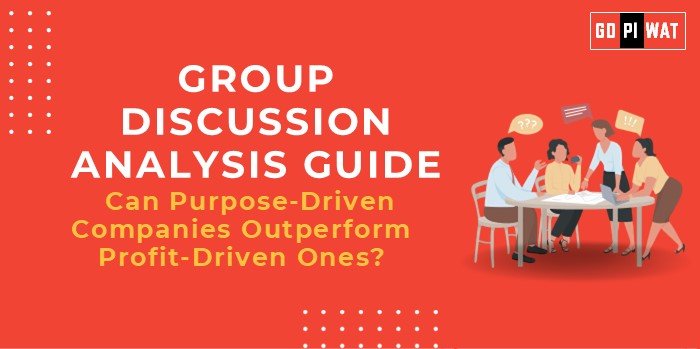📋 Group Discussion (GD) Analysis Guide
🌍 Topic: Can Purpose-Driven Companies Outperform Profit-Driven Ones?
🌟 Introduction to the Topic
📌 Opening Context: “In today’s evolving corporate landscape, businesses are increasingly judged not just by their profitability but also by their purpose, impact, and values. Purpose-driven companies like Patagonia and Tesla are setting benchmarks for balancing social good and business success.”
📌 Topic Background: “The traditional approach of prioritizing shareholder value is being challenged by stakeholders demanding a focus on environmental, social, and governance (ESG) objectives. The question is whether purpose can fuel greater long-term performance compared to profit-centric models.”
📊 Quick Facts and Key Statistics
- 🌍 ESG Growth: Global ESG investments reached $40 trillion in 2024.
- 📈 Financial Performance: 80% of companies with strong ESG performance report higher profitability over 5 years (HBR, 2024).
- 💡 Consumer Preferences: 64% of global consumers are willing to pay more for sustainable products (Nielsen, 2023).
- 👩💻 Millennial Workforce: 76% of millennials prioritize company purpose when choosing jobs.
- 🤝 Corporate Trust: Unilever’s sustainable models led to 20% higher consumer trust in 2023.
🏢 Stakeholders and Their Roles
- Businesses: Balance profitability with purpose while maintaining shareholder trust.
- Consumers: Demand ethical practices, sustainable products, and transparency.
- Investors: Evaluate companies based on ESG metrics for long-term resilience.
- Employees: Seek meaningful, value-driven work environments.
- Governments/NGOs: Enforce regulations and collaborate to achieve sustainable development goals (SDGs).
📈 Achievements and Challenges
🎯 Achievements
- 📊 Long-Term Profitability: Patagonia’s revenue grew 10x with its “Planet First” purpose.
- 💰 Investor Confidence: BlackRock saw a $500 billion ESG inflow in 2023.
- 🛍️ Customer Loyalty: Unilever’s sustainable brands drove 70% of its revenue growth.
- 📢 Brand Reputation: Purpose-driven companies outperform competitors by up to 25% in brand value.
⚠️ Challenges
- ⏳ Short-Term Pressures: Profit-driven firms often deliver quicker shareholder returns.
- 📏 Measurement Dilemma: Aligning purpose with measurable KPIs is complex.
- 🔄 Execution Gaps: Companies struggle to implement authentic purpose beyond marketing.
🌍 Global Comparisons
- 🇩🇰 Denmark’s Novo Nordisk balances affordable insulin with 7% annual growth.
- 🇺🇸 USA’s Patagonia prioritizes environmental goals while maintaining profitability.
🛠️ Structured Arguments for Discussion
- Supporting Stance: “Purpose-driven companies foster innovation, customer loyalty, and long-term profits, evident in brands like Patagonia and Tesla.”
- Opposing Stance: “Profit-driven strategies maximize shareholder value in the short term, which is essential for business sustainability.”
- Balanced Perspective: “While profit is necessary, integrating purpose builds resilience, brand trust, and sustainable growth over time.”
🎯 Effective Discussion Approaches
- Opening Approaches:
- 📊 “Global ESG investments grew to $40 trillion, proving that purpose can drive profitability.”
- 📝 “Tesla and Novo Nordisk showcase how purpose aligns with strong financial outcomes.”
- Counter-Argument Handling:
- Rebuttal: “Short-term profits are unsustainable; ESG-driven companies outperform in long-term resilience.”
🔍 Strategic Analysis of Strengths and Weaknesses
- Strengths: Long-term growth, customer loyalty, investor confidence.
- Weaknesses: Short-term ROI pressure, difficulty in quantifying purpose metrics.
- Opportunities: Rising ESG investments, millennial workforce alignment.
- Threats: Greenwashing risks, resistance from profit-first stakeholders.
📚 Connecting with B-School Applications
- Real-World Applications: Topics like ESG investing, sustainability strategies, and ethical leadership.
- Sample Interview Questions:
- 💡 “Can purpose and profit coexist in the corporate world?”
- 🔄 “What strategies should businesses adopt to balance purpose and performance?”
- Insights for B-School Students:
- 🌱 Explore ESG-driven business models for finance and strategy projects.
- 📈 Understand how purpose fosters innovation and resilience.


